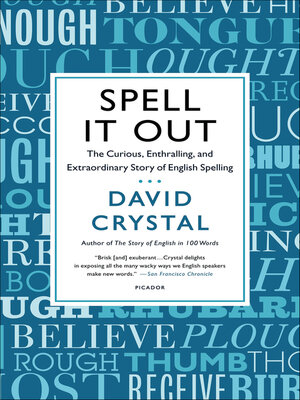Spell It Out
ebook ∣ The Curious, Enthralling, and Extraordinary Story of English Spelling
By David Crystal

Sign up to save your library
With an OverDrive account, you can save your favorite libraries for at-a-glance information about availability. Find out more about OverDrive accounts.
Find this title in Libby, the library reading app by OverDrive.



Search for a digital library with this title
Title found at these libraries:
| Library Name | Distance |
|---|---|
| Loading... |
"[A] whirlwind review of the history of English spelling . . . with small gems of discovery every few pages." —Booklist Why is English spelling so difficult? In thirty-seven short, engaging and informative chapters, linguist and logophile David Crystal takes readers on a history starting with the Roman missionaries' sixth-century introduction of the Roman alphabet and ending with where the language might be going. He looks individually at each letter in the alphabet and its origins. He considers the question of vowels and how people developed a way to tell whether or not it was long or short. He looks at influences from other cultures, and explains how English speakers understood that the "o" in "hopping" was a short vowel, rather than the long vowel of "hoping." If you've ever asked yourself questions like "Why do the words 'their,' 'there,' and 'they're' sound alike, but mean very different things?" or "How can we tell the difference between 'charge' the verb and 'charge' the noun?" Spell It Out will spell it all out for you. Acclaim for David Crystal's The Story of English in 100 Words "Brisk [and] exuberant." —San Francisco Chronicle "The best word book to come down the pike in many a moon . . . ingenious." —Patricia T. O'Conner and Stewart Kellerman, authors of Origins of the Specious: Myths and Misconceptions of the English Language







